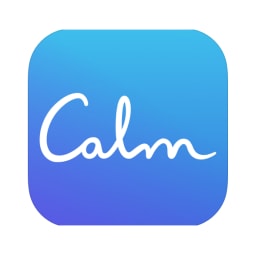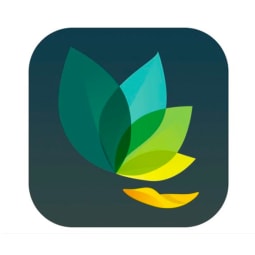Advertisement
7 Stellar Meditation Apps To Deepen Your Practice (Or Start It!)


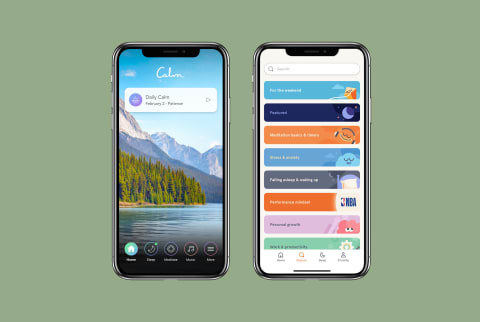
Those who meditate regularly swear by it—and those who don't, well, may have some trouble getting started. In either case, choosing the right app for you and your specific needs is a great way to take your meditation practice to the next level.
So, we rounded up our top seven picks for the best meditation apps of 2023, plus learn why now is as good a time as ever to start your meditation journey.
The best meditation apps:
The benefits of meditation.
Meditation comes with so many benefits, and the good news is, there are a ton of different types of meditation to suit a variety of needs and experience levels.
Whichever style you opt for, research1 has found meditation has been to lower stress, pain, anxiety, and depression, as well as improve mindfulness, memory, and overall efficiency. On a physiological level, it even shows benefits for heart and brain health, increasing gray matter in the brain, and lowering blood pressure, among other things.
And these benefits are sure to make their way into even the smallest areas of your life, helping you to make more mindful decisions and operate from a place of ease and presence every day.
"Daily meditation physically alters our brain. It increases the size of areas of our brain involved in: learning and retaining information, memory, focusing attention, integrating and regulating emotions, empathy and compassionate behaviors, language processing, perspective taking abilities, maintaining balance and coordinating movement, and management of willpower," Leah Santa Cruz, Meditation Coach at Balance explains. "We also see a reduction in the area of the brain that controls the energy we spend on fear, stress, and anxiety."
Starting a meditation practice.
No matter how much you learn about the benefits of meditation, the thought of starting a practice (and sticking to it!) can still feel overwhelming. "The biggest challenge with learning to meditate is welcoming all parts of yourself during meditation," Santa Cruz emphasizes. "Thoughts, sensations, sounds and emotions alike. Most people come to meditation with the misguided expectation of eliminating thoughts, but that sets you up for frustration and feelings of failure. It's important to know that thoughts are one of the ways the mind-body system releases tension and stress."
In terms of how to overcome these blockages, Santa Cruz says, "The biggest learning curve for beginners is developing the skills of effortlessness and welcoming. No longer fighting against yourself but allowing all parts of yourself and not feeling you need to hold on to or chase away thoughts. Just becoming aware of them and welcoming them without effort." She stresses the importance of actually allowing yourself to be a beginner, and finding a teacher or platform who's methods align with your needs.
How we picked:
Reviews
When choosing these apps, we only included those we've tried ourselves (and loved), ones recommended by a meditation instructor, and a few more with outstanding user reviews. It's still a good idea to try out a few to find the right fit, but you can trust that all of these picks have been well vetted.
Cost
Meditation should be accessible for everyone—especially considering it only requires you and your mind. The apps we've chosen offer the best quality for the best value, with a range of different price points for every budget (yes, including free ones!).
Variety
And of course, everyone's meditation practice is going to look a little different, so we chose apps that offer various types of meditation, diverse instructors, and additional tools to explore.
Flexibility
Lastly, all of these apps allow you to start for free before committing to a subscription. Not that we think you won't like them—but it's always better to see for yourself!
Our picks for the best meditation apps of 2022:
Pros
- Web content is free
- Progress and personal statistic tracking
- Ability to add friends
- Options to set reminder notifications
Cons
- Majority of meditations are the voice of the founder
Best for:
Getting startedTrial period:
14 daysIf you're new to meditation, Headspace is a great option to start with. What's great about this app is how it teaches the foundational aspects of meditation, such as body scanning, compassion, and mindfulness, so you can grow your practice from the ground up. It was actually founded by former Buddhist monk, Andy Puddicombe (who narrates many of the meditations), so you know it was created with heart.
If you're hoping to develop a regular meditation practice, the annual subscription will save you significant money when compared to monthly payments. An annual Headspace subscription breaks down to $5.83 per month, whil monthly subscribers pay $12.99. What's more, Headspace offers students a full annual membership for only $9.99. And, if you're still on the fence, you'll have a 14-day free trial to decide whether Headspace is worth it. Just make sure to cancel your membership before the trial ends, to avoid being charged the full amount.
To learn more about how Headspace relates to the most popular meditation app, Calm, read our full comparison of the two.
Cost: $12.99/month or $69.99/year
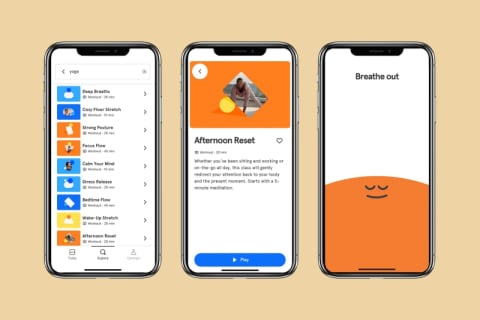
Pros
- Large library of yoga, movement, and meditation content
- New videos daily
- Sound bath, breathwork, and yoga nidra content
Cons
- More of a yoga/fitness app than a meditation app
Best for:
Mindful movement goalsTrial period:
14 daysAlo Moves may be thought of more as a yoga app, but don't be fooled—there's loads of great meditation content available on here. (Plus, yoga and meditation traditionally go hand in hand.) Sound healer and meditation expert Susy Markoe Schieffelin says she loves this app because it frequently offers discounts and its collection is constantly expanding. "They're going to start offering reiki, they're going to start offering face yoga—really interesting things," she explains. Along with Alo's meditation content, the app also offers sound baths, yoga nidra, breathwork, and more—and the reiki content has since been added, too!
Cost: $20/month or $199/year
Pros
- Variety of experts (and celebrities) featured in the app
- Range of meditations for different goals (i.e., sleep or stress)
- User-friendly with regular updates
- Offers progress and mood tracking
- Additional masterclasses
Cons
- Less spiritually focused
Best for:
Lots of optionsTrial period:
7 daysWith over 1.5 million five-star reviews, there's a reason Calm made it on our list. Arguably the world's most popular meditation app, Calm is all about using mindfulness to improve your quality of life—and the resources they offer can help you do so. They have everything from walking meditations to breathwork techniques to a new meditation (coined the "Daily Calm") every day. We're just scratching the surface of all the great perks of this app, but luckily you can try it for free to see for yourself—and even keep it free if you like.
Check out our Calm review to learn more.
Cost: Free for basic access, with premium plans at $14.99/month, $69.99/year, or $399.99 for life. (Student, family, and corporate plans also available.)
Advertisement
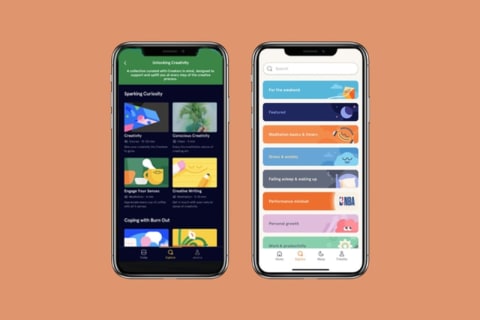
Pros
- Simple timer function
- Ability to add friends
- Milestone and progress tracking
- Additional courses and workshops
Cons
- Lots of options can be overwhelming
- Certain extras have to be paid for outside of the premium subscription
Best for:
Building up your existing practiceTrial period:
30 daysAccording to Markoe Schieffelin, Insight Timer is a classic, go-to meditation app for good reason. "I only use it for the timer, but I always recommend it to people, because there are thousands and thousands of options," she tells mbg. And she's right: If you simply want to use the timer function for a silent meditation, that's a possibility. But the app also has meditations for sleep, stress, and so much more.
Cost: Free for basic access, with a premium subscription available for $60/year
Pros
- Emphasis on spirituality and personal development
- 21-day series
- Journaling series
- Quiz for personalized experience
Cons
- No ability to add friends
Best for:
Deepening spiritualityTrial period:
7 daysIf you're looking to incorporate more meditation into your spirituality, we'd recommend the Chopra app. Founded by none other than world-renowned guru and mbg Collective member Deepak Chopra, this app puts a focus on discovering your true essence—mind, body, and spirit. It even includes a quiz to personalize your experience so you can get the most out of the app. With hundreds of meditations, 21-day programs, journaling prompts, and more, this is worth a test run if you want to learn more about meditating—and yourself.
Cost: $69.99/year
Advertisement
Pros
- Longer trial period than most
- Emphasis on better sleep
- Easy-to-operate interface
- Podcast in the app
Cons
- You have to email support for access to the monthly subscription
- Doesn't provide foundational spiritual knowledge
Best for:
Improving quality of sleepTrial period:
7 days30 days10 Percent Happier holds our spot for the best meditation app for sleep, with a wide catalog of meditations available to help you ease stress and doze off. The app was founded by retired journalist and author of 10 Percent Happier Dan Harris, who was inspired to share all the benefits he found from his own meditation practice. The extremely accessible interface makes the app feel approachable, with a focus on developing a consistent, yet simple, mindfulness practice. It's worth noting that in order to access a monthly subscription, you have to email support@tenpercent.com—and keep an eye out for 30-day trials, as the trial is usually only seven days, but they occasionally offer 30.
Cost: $99.99/year (email support to inquire about monthly subscriptions)
Pros
- Totally free
- Customizable meditation tracks
- Lots of content about breathing/breathwork
Cons
- Less variety than other apps
Best for:
Mitigating stressTrial period:
Free—no trial requiredAnd last but certainly not least, we have the Oak meditation and breathing app. That's right—if you want to learn how to harness the power of your breath to beat stress, this is the app to try, with plenty of guided breathing and breathwork content. And while their library may not be as expansive as some of the other options on this list, sometimes that's not a bad thing. As one happy reviewer writes, "All the other apps have thousands to choose from that it's too overwhelming that I don't feel like meditating. This app has helped me extremely with the stress and anxiety I've had." And did we mention it's totally free? Because it's free!
Cost: Free
Advertisement
FAQs
Are meditation apps worth it?
Whether you're new to meditating or you want to deepen your existing practice, meditation apps have a wide array of content, meditation styles, workshops, and more, to take your practice to new heights. Ultimately, anyone can benefit from these tools.
How do meditation apps work?
While each app has its own unique bells and whistles, they all provide meditation content to people all over the world. They allow users to access videos, audio, etc., to meditate in their own homes or whenever they need a breather. Most meditation apps nowadays also have a notifications function, giving a gentle reminder to meditate when you can.
Headspace vs. Calm
Headspace and Calm hold the top two spots for the most downloaded meditation apps, and while we're not looking to pit them against each other, we will say one may be better than the other depending on your needs. We've compared the two at length in our full review.
For one thing, Headspace is a bit more beginner-friendly, and the monthly subscription costs a bit less. Calm, on the other hand, has a bit more to offer in terms of content but might be better suited for someone with a little more experience. One isn't inherently better than the other, it really just depends on your needs.
Luckily, they both offer free trials, so the best way to answer the Headspace versus Calm question is to try them both out yourself!
The takeaway
Meditation has so much to offer in terms of spiritual, physical, and mental well-being. While getting started may seem intimidating, these seven vetted meditation apps are here to help. Even if you've been meditating daily for years, with these on your phone, there will always be something new to discover.
Meet The Experts

These 6 Simple Steps Will Make The Age Of Aquarius Your Best Era Yet
Perpetua Neo, DClinPsy

These 6 Simple Steps Will Make The Age Of Aquarius Your Best Era Yet
Perpetua Neo, DClinPsy

These 6 Simple Steps Will Make The Age Of Aquarius Your Best Era Yet
Perpetua Neo, DClinPsy

These 6 Simple Steps Will Make The Age Of Aquarius Your Best Era Yet
Perpetua Neo, DClinPsy


